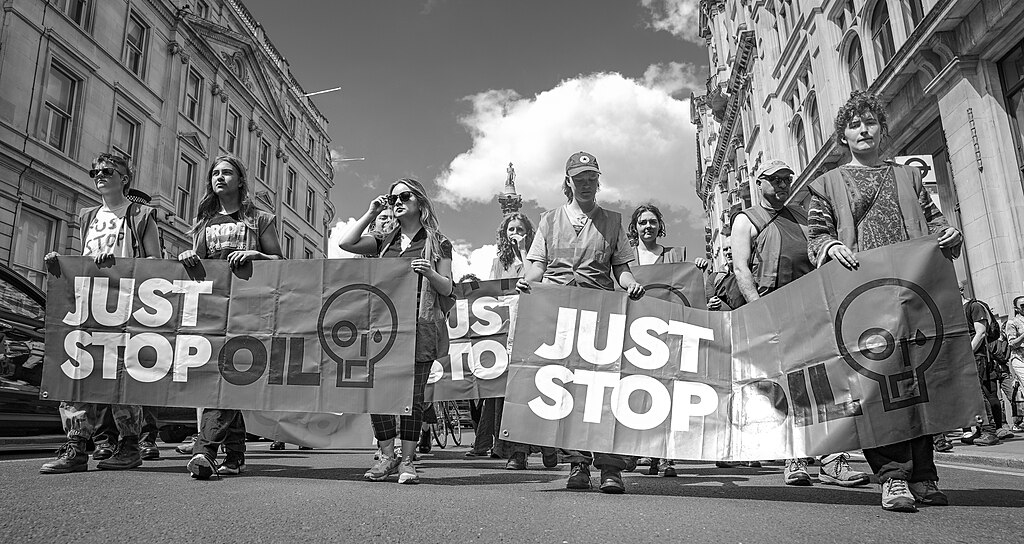Is Activism a Part of Responsible Climate Scholarship?
Academics needn’t become activists, but I argue that we must support activism. Indeed, inclusive engagement with activism could enhance our scholarship.
Climate activism has diverse expressions. From blowing up pipelines, to throwing orange cornflour on historic monuments. From street protests to writing politicians. In the opinion of some commentators, scientists and scholars should steer clear of all such activities. Some fear alienating publics from science and scholarship. Others suggest that participating in activism reveals a disturbing lack of objectivity. Such arguments against “climate scientists becoming climate activists” are happily boosted by climate denialists, delighted to have another stick with which to beat climate science and to insinuate that climate scholarship is biased.

Like other contestation over the role of activism, this debate won’t end soon. But I believe that climate scholars are morally justified in being active, and in supporting activists. To begin with, our embodied nature and situated existence in the world mean that to deny our interests in halting climate change would be disingenuous. If we want to see change, it would seem irrational to eschew helping key change agents. Perhaps more importantly there is also a massive imbalance of power and resources between climate justice activists and the political and commercial interests resisting transformative climate action. Climate justice activism has been met with continued political resistance, and in several countries, by moves to suppress and criminalize it. In this context, simplistic ideas of academic neutrality or impartiality leave academics complicit with the powerful elites that have failed to take adequate climate action.
Online deliberations
These beliefs helped motivate me to bring together activists and academics from several European countries. We gathered in a series of online deliberations to explore how climate scholars could better support and enable climate activism, with surprising results.
Many scholars aspire to deliver research that supports activism, and actively engage with publics and activists even at personal cost. But there are also many who are deterred from engaging by demands for scientific impartiality, and institutions that prioritise publications and patents over community engagement. Junior and precarious academics are especially affected in this regard. Measures of impact for research evaluation and funding purposes also place little weight on the use of research by activists.
So we designed virtual workshops to create space for discussion, sharing of experiences and the development of proposals for the future. We shared an aspiration to generate an output of broader value. The group itself came up with the idea of a set of principles in the form of a “minifesta” for academic-activist engagement. A minifesta is a propositional document that is, in contrast to a manifesto, incomplete, situated and embraces diversity.
Below I summarize those principles, in the hope that they will inspire readers to apply them in your own activities.
A minifesta for academic-activist collaboration
1. Commit to honesty and transparency. Be open about the state of the climate, our emotional responses, and our understanding of the power, politics and interests involved in claims about climate change and potential responses.
2. Recognize and embody the urgency. Deliver good quality research that is responsive to the opportunities that activism can open up, and that helps expose the political and commercial interests that resist collective action and promote delay.
3. Promote ethical collaboration and engagement. Bring in diverse perspectives, different approaches and new knowledge, engage and mobilize new actors, to generate outputs more effective in supporting transformation.
4. Create safe spaces for collaboration. So both activists and academics can express themselves freely without fear of physical, cultural or emotional violence, come together to share and learn, and provide mutual support in the face of abuse, denial and oppression.
5. Support healthy democracy through support for activism. Engage and collaborate with activists to reinforce participation, support critical and active citizenship and counter the power of disinformation.
6. Stand up for activism. Support collective action to resist trends such as the criminalization of protest, and the listing of social and environmental activists as extremists under anti-terror initiatives.
7. Recognise and support multiplicity and inclusion. Conduct collaborative engagement processes that challenge discrimination and structural exclusion and instead lift up voices that are not usually heard or able to be heard.
8. Value emotion. Recognize the validity and power of emotional as well as intellectual knowledge for effective action and transformation.
9. Combine diverse knowledges and ways of knowing. Accept, encourage and value multiple ways of understanding and talking about climate change and its impacts, learning especially from activists, indigenous, affected and vulnerable communities.
10. Work to remove institutional obstacles to timely collaboration with activism. Instead push for positive incentives and supportive practices: a particular duty for senior academics, with more influence and capacity to act.
11. Follow-through engagement to support participants and outcomes. Good quality collaboration involves follow-through by the convenors, to sustain impact, and to care for participants, throughout and beyond the formal engagement.
Lessons for climate scholars
Everyone from the IPCC downwards seems to agree that we need transformative change urgently, at scale. And that scientific appeals for action have failed to generate adequate responses. In the deliberative processes that generated this minifesta, the scholars involved moved past an expectation that their role was to inform or teach the activists. We came to understand the rich prospects for mutual learning and empowerment that arise in inclusive collaboration. Scholars working on climate issues in any discipline could similarly benefit from increasing mutually supportive collaboration with activists. Such collaboration can not only enhance the impact of our scholarship, but also its quality.
For more detail of both the principles and the deliberative process, see McLaren et al 2024, Developing a minifesta for effective academic-activist collaboration in the context of the climate emergency. Frontiers in Education
Reader Comments
2 Replies to “Is Activism a Part of Responsible Climate Scholarship?”
Comments are closed.







Climate is like public health–it affects very large groups of people by definition. Public health, like climate, has also become politicized by aggressive, antisocial, anti-science activists.
Before that politicization, no one would have thought that a public health scientist recommending a public health action was violating any ethic.
I’m not sure why climate is any different in that regard, except that certain ideologically and financially motivated activists have made it so.
There’s a limit, of course. No one climate scientist should be able to impose any particular action on society. But there should be a process whereby GHG-reducing actions could be debated and recommended by climate scientists without fear of losing credibility. The credibility of the recommended action is up for debate, but the act of recommending it shouldn’t be.
All good points, Ray. Thanks! It so deprives public debate when scholars are deterred from advocacy on the issues they research.